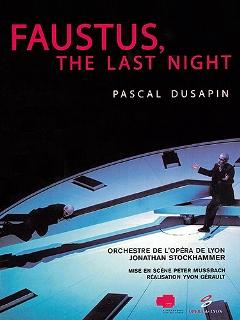Pascal Dusapin - Faustus, The Last Night (2007)
Pascal Dusapin - Faustus, The Last Night (2007)

1. Faustus George Nikl – Faustus (Baritone) Urban Malmberg – Mephistopheles (Baritone) Robert Worle – Sly (Tenor) Jaco Huijpen – Togod (Bass) Caroline Stein – L’Ange I T he Angel (Soprano) Lyon National Opera Orchestra Jonathan Stockhammer – conductor
“Faust is a timely presentation of the narcissistic lunacy prevailing in contemporary culture, turning our ideals upside down as we realize that Faust, overestimating his own strength, failed and succumbed.” So wrote the composer Pascal Dusapin about his subject. This is not the Faust of Goethe, hence the use of the longer form of Faustus. “Ultimately, I prefer Mephistopheles. I think he is fun. And my Mephistopheles has to be fun!.” Again the composer on his own creation, this time speaking revealingly on his characterization. In fact, as the included filmed interview proves, Dusapin is remarkable eloquent on every aspect of his opera, from his inspiration from Marlowe’s original and not Goethe’s to the vortex of bare nerve-endings his music evokes.
Jonathan Nott likens the challenge of conducting this to conducting Bruckner, as Dusapin works with solid masses of sound. The blocks are distinctly modernist ones—there is no concession to anything remotely easy on the ear here. The libretto echoes the music in its user-unfriendliness, being littered with quotations from Dante, Augustine, The Bible, Caligula, and Al Capone, to name but a few. The language Dusapin chose was English, interestingly.
Despite the debt to Marlowe, there is no clear, clean story in this opera. The work is based around emotions, from the permanently afraid Angel (who quotes William Blake) to the paradoxically accepting terror of Faustus, who knows he is damned. To Dusapin, Faustus is “the very worst type of human being.” Sly is a Shakesperean vagabond-drunk ( Taming of the Shrew ). Togod (think “To God,” but also “Godot” anagrammatically) is a fallen angel who is the only one of the cast who is able to openly ridicule God. Togod is a watcher.
The opera is set on a huge clock face. Faust and Mephistopheles are presented almost as twins (similar dress, similar baldness, initially in an all-enveloping blue light). The setting on a clock face not only emphasizes the inevitability of time and death but provides the perfect setting for Mephistopheles (“Meph,” for short) to gush forth his meditations on time itself.
All five cast members are superb, but if there is one who deserves special praise it is Caroline Stein, whose silver-white-clad Angel is like a Bergian Lulu on super-heat. (Interestingly, there is a red moon that looks as if it has been borrowed from Wozzeck too.) Dusapin shows no mercy in the stratospheric reaches he demands, or in the sheer stamina of the part. Robert Wörle’s Sly is hugely funny. Both Urban Malmberg as Mephistopheles and Georg Nigl as Faustus are stunning in their portrayals of the two characters’ codependent relationship. Malmberg is possessed of huge vocal power, while with Nigl it is his huge emotional-expressive range that impresses. When Faust finally asks, “Meph, do you know what is going to happen?”, it is sung with a preternatural beauty that brings a real tear to the eye. And not many overtly modernist operas can do that!
But it is Dusapin who is the most impressive of all. He is a master of composed stasis, of implying a time that is out of joint. His orchestration is a model of its kind. Certainly it is bleak, dark, and intense, but despite this intensity it is never unwittingly crowded.
Picture quality is of the very best, as one has come to expect from Naïve. Unhesitatingly recommended—to the brave. --- Colin Clarke, Fanfare, arkivmusic.com
download: uploaded anonfiles yandex 4shared solidfiles mediafire mega filecloudio








